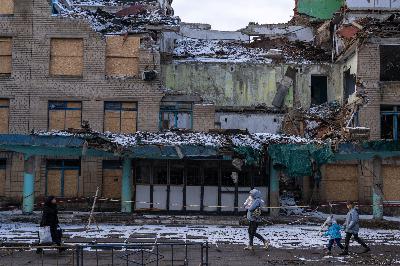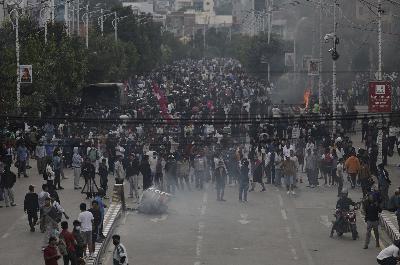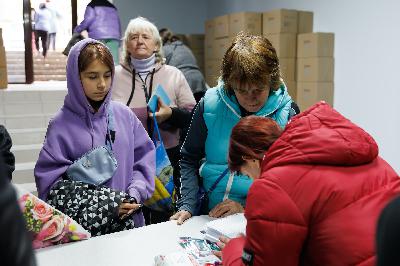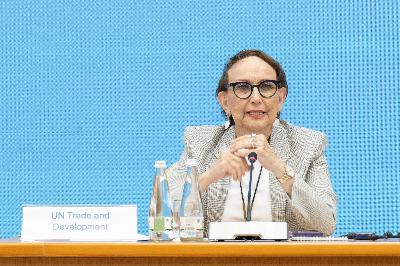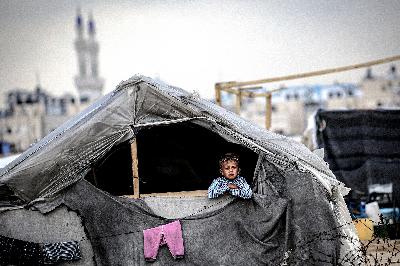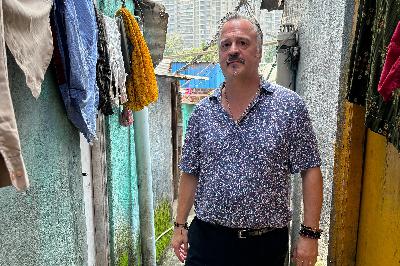Discover UN Interviews
UN Interviews

UN Interviews
Author: United Nations
Subscribed: 57Played: 1,422Subscribe
Share
Description
UN News interviews a wide range of people from senior news-making officials at Headquarters in New York, to advocates and beneficiaries from across the world who have a stake in helping the UN go about its often life-saving work in the field.
893 Episodes
Reverse
Five years away from the 2030 deadline, none of the global gender equality targets are on track. From poverty to conflict, the setbacks are staggering.According to a new UN report launched on Monday, extreme poverty rates for women and girls have hardly moved in the last five years.Data shows that by the year 2030, there will be 351 million women and girls who live in the very worst forms of poverty around the world.But the report also points to real solutions, and what’s possible when countries invest in women and girls.UN News’s Ana Carmo sat down with Sarah Hendriks, Director of the Policy Division at UN Women, to discuss the main findings of the 2025 SDG Gender Snapshot report.
With just five years left to achieve the Sustainable Development Goals (SDGs), not a single gender equality target is on trackThe finding comes in the Gender Snapshot 2025 report issued on Monday by UN Women and the UN Department of Economic and Social Affairs (DESA).Prior to the launch, UN News’s Anshu Sharma spoke to Christine Arab, UN Women’s Regional Director for Asia and the Pacific.She discusses the report and how women’s groups there are ensuring their voices are heard, including in promoting climate resilience.
Around the world, education is under attack, impacting millions of children. In Ukraine alone, more than 1,800 schools have been damaged or destroyed since 2022, according to the UN Children’s Fund (UNICEF), depriving countless children of their right to safe learning.But the crisis goes beyond damaged buildings. Nelson Rodrigues, Education Specialist for UNICEF Ukraine, told UN News that children’s well-being has been severely damaged by constant air raid alerts, living underground in shelters – and the psychological toll of uncertainty.He told UN News's Nargiz Shekinskaya the disruption is not only about shattered classrooms – it’s also about the daily resilience children must show just to keep learning under fire.
Following the Nepalese government’s ban on social media platforms due to non-registration and concerns about misinformation, large youth-led protests erupted across the capital Kathmandu and other cities on Monday.The demonstrations are escalating rapidly, with at least 15 people killed and more than 100 injured amid clashes, curfews, and reports of police using tear gas and possibly live ammunition.UN Resident Coordinator in Nepal, Hanaa Singer-Hamdy, described the events as “unlike Nepal,” expressing deep concern for civilian safety and stressing the urgent need to ensure unrestricted medical access for the injured.UN News’s Anshu Sharma began by asking her to describe the situation on the ground.
Nearly four years into Russia’s full-scale invasion of Ukraine, and 11 years since conflict began, the toll on people’s mental health is severe.Women and girls are disproportionately affected, facing displacement, economic uncertainty, heightened risks of gender-based violence, and the constant pressure of protecting their families during repeated attacks.Speaking from the capital Kyiv, which suffered deadly strikes last week, and following a visit to the frontline region of Sumy, UN Women’s Representative in Ukraine Sabine Freizer Gunes described both the emotional exhaustion and resilience of women.She told UN News’s Nathalie Minard that empowering women and restoring a sense of normalcy are crucial steps to help relieve the stress of war.
The numbers of dead and wounded following the deadly earthquake in remote eastern Afghanistan – as well as the needs of survivors – are going to climb in the days ahead, the UN warned on Tuesday.The head of the UN aid coordination office (OCHA) in Afghanistan, Amy Martin, told UN News’s Sachin Gaur that at least 20 emergency rapid assessment teams have been deployed, amid major access challenges, a disastrous drought – and shrinking aid budgets.
The head of the UN agency for Palestine refugees (UNRWA), Philippe Lazzarini, has renewed his urgent call for a ceasefire in Gaza, warning that civilians face death not only from bombardment but also from mass starvation and lack of aid.Despite severe restrictions on humanitarian access, UNRWA continues to provide medical care, clean water, and shelter to hundreds of thousands. But Israel continues to severely impede food distribution – despite international food experts’ assessment that famine will spread.“Every hour today counts, the more we wait, the more people will die,” the UNRWA Commissioner-General said in an interview with UN News’s Daniel Johnson.
The UN Interim Force in Lebanon, UNIFIL, has operated since the late 1970s, tasked with monitoring the demilitarisation of the south of the country, supporting the Lebanese army, and ensuring that humanitarian aid reaches civilians in need.Every year, the mandate has to be renewed by the Security Council, but powerful voices have been raised against extending it, which could spell either its closure, or lead to budget cuts that reduce its ability to operate effectively.With the Security Council deadline just a few days away, Nancy Sarkis from UN News spoke to Andrea Tenenti, UNIFIL’s long-time spokesperson, and began by asking him to explain why it’s still needed.
An education specialist who left Somalia as a child when the civil war broke out in 1991 has now returned to support the Ministry of Education as they expand national testing. The programme which enabled this specialist, named Shire Salad, to return — Migration for Development in Africa or MIDA — is run by the International Organization for Migration (IOM) and recruits diaspora experts who have a “personal desire to give back."MIDA then pairs these experts with local professionals who work together to advance the development of hospitals, schools and other institutions. While the diaspora experts ultimately leave, the hope is that their skills will remain. UN News’ Naima Sawaya spoke with Mr. Salad about his experience returning to Somalia after so many years.
People in Haiti are living through “hell on earth,” according to William O’Neill, the UN’s designated expert on human rights in Haiti. Armed gangs – predominantly in the capital Port-au-Prince – are parasitically extracting financial resources from the population and perpetrating horrific acts of violence, he says – but they’re just one cog in a larger cycle of impunity, corruption and violence.Following the release of the most recent report on human rights in Haiti, UN News’ Naima Sawaya spoke to Mr. O’Neill about whether a path forward to peace even exists. She began by asking if he had ever met a gang leader.
In Gaza, women and girls have been bearing the brunt of the catastrophic humanitarian situation for the past 22 months. In addition to the constant threat of sexual violence, pregnant and breastfeeding mothers in the enclave face a daily struggle to get the help they need. Despite the continuing devastation – as Israel moves to assert more military control over the enclave – the UN Population Fund (UNFPA) and partners are mobilised and working around the clock to provide life-saving services on the ground, as UN News’s Nathalie Minard has been hearing from Laila Baker, Regional Director for Arab States for UNFPA.
In Sudan, as violent conflict between forces of the Sudanese military and their rival Rapid Support Forces militia rages for its third year, women are facing the brunt of the humanitarian crisis.Female-led households struggle to access food, girls and women face high risks of exploitation and abuse when trying to access humanitarian aid, and all the while, A accessible women-run organizations are vastly under-resourced.Salvator Nkurunziza, the UN Women representative in Sudan, sat down with UN News’s Abdelmonem Makki to discuss the struggles women face in Sudan and the solutions that should be implemented.
Some 1.3 million people displaced. 5.7 million people not getting enough food. How do you even begin to conceive of the magnitude of Haiti’s crisis, borne from years of political insecurity, gang violence and climate shocks? And how do you begin to feed the country?For Pierre Vauthier, Food and Agriculture Organization (FAO) Representative in Haiti, hope lies in smaller, locally-driven solutions which empower communities to take control of their own food production. A school feeding programme, for example, which instead of financing imported food, uses funds to expand the capacities of local farmers, not only feeds children but also generates rural self-sufficiency.UN News’ Naima Sawaya spoke with Mr. Vauthier to learn more about FAO’s work in Haiti and why he remains hopeful for Haiti’s future.
More than 30 landlocked developing countries – from Bolivia to Bhutan and Burkina Faso – face some of the world’s highest trading costs, deepest poverty and weakest investment flows.Rebeca Grynspan, head of the UN’s trade and development agency, UNCTAD, has told UN News that they are "invisible to much of the world", prisoners of outdated structural constraints.Speaking on the sidelines of the Third UN Conference on Landlocked Developing Countries, in Awaza, Turkmenistan, she explained to Nargiz Shekinskaya why digital trade, regional integration and long-term investment are critical to unlocking their potential.
If ever the world needed to agree on stopping plastic pollution, it’s now, supporters of a deal say.According to the UN Environment Programme (UNEP), plastic production and waste is due to triple by 2060.In Geneva, where international talks are underway this week for a legally binding deal to stop plastic pollution, campaigners are also having their say.They include Shellan Saling, from California, who’s the interim chair of the Youth Plastic Action Network (YPAN). Achieving an ambitious treaty is critical today because plastic impacts everything from climate change to people’s health and much more besides, she explains.
Human trafficking is a global threat driven by organised crime and each year, more and more women, children and men are being exploited, including for forced labour and sex.That’s according to the UN Office on Drugs and Crime (UNODC) which works to provide humanitarian, legal and economic assistance to survivors. Through the UN Voluntary Trust Fund for Victims of Trafficking in Persons (UNVTF), the UN prioritises working with grassroot organisations carrying out survivor-led initiatives, facilitating on-the-ground assistance and protection to victims of trafficking.On the World Day Against Trafficking in Persons, UN News’s Emma Trager-Lewis met with Mira Sorvino, Oscar-winning actress and UNODC’s Goodwill Ambassador for the global fight against human trafficking.
UN agencies continue to draw attention to the dire conditions in Gaza, where food security experts warned this week of mounting evidence of famine and widespread starvation due to conflict, displacement and the near-total collapse of essential services.Ricardo Pires, Communication Manager with the UN Children’s Fund (UNICEF), is fresh from a mission to the enclave, where a man-made drought is also looming.He told UN News’ Daniel Johnson that lack of drinking water means children are dehydrated and at risk of disease as families resort to using contaminated water sources.
Around the world, women and girls of African Descent continue to face the double burden of racism and sexism, often navigating systemic barriers that hinder their development and violate their rights, according to the UN reproductive health agency, UNFPA.Last year, the UN General Assembly voted to recognise 25 July as the International Day for Women and Girls of African Descent as they continue to face multiple and overlapping forms of discrimination, manifesting in higher rates of poverty, barriers to education, limited access to quality healthcare, and underrepresentation in decision-making.UNFPA’s “Leave No One Behind" commitment focuses on dismantling systemic barriers and ensuring equal access to rights, services, and health outcomes for all women and girls.UN News’s Emma Trager-Lewis sat down with Patricia DaSilva, UNFPA Senior Programme Adviser and Global Coordinator for “Leave No One Behind” to discuss how the agency is working to uplift women and girls across the African diaspora.
Over one billion people live in slums and informal settlements globally, with that number expected to triple by 2050. And yet, in official data and national censuses, these people are often invisible. Denis Jobin, a senior evaluation officer at UN children’s agency, UNICEF, visited multiple slums across four countries in order to change this, collecting quantitative and qualitative data to illuminate the challenges informal settlements face. UN News’ Naima Sawaya sat down with Mr. Jobin following a side-event at the High-Level Political Forum on Sustainable Development (HLPF) in New York to better understand the conditions of people living in informal settlements.
Regulations to govern the exploration and extraction of rare earth minerals on the seabed of international waters are being hammered out by the UN’s International Seabed Authority (ISA) despite the reported decision by the US government to go “alone”.The demand for rare earth minerals, which are needed to make batteries and other technology, is on the increase globally. Jamaica-based ISA is a specialised agency mandated to regulate the deep seabed of international waters, which makes up over 50 per cent of the world’s underwater surface area.Its 170 Member States are developing a code of conduct to mine for minerals in a sustainable and equitable way which benefits all nations, not just technologically advanced ones. Eileen Travers spoke to the organization’s Secretary-General, Leticia Carvalho, and began by asking her about the status of the code.Read our explainer on ISA and why it matters now here.




